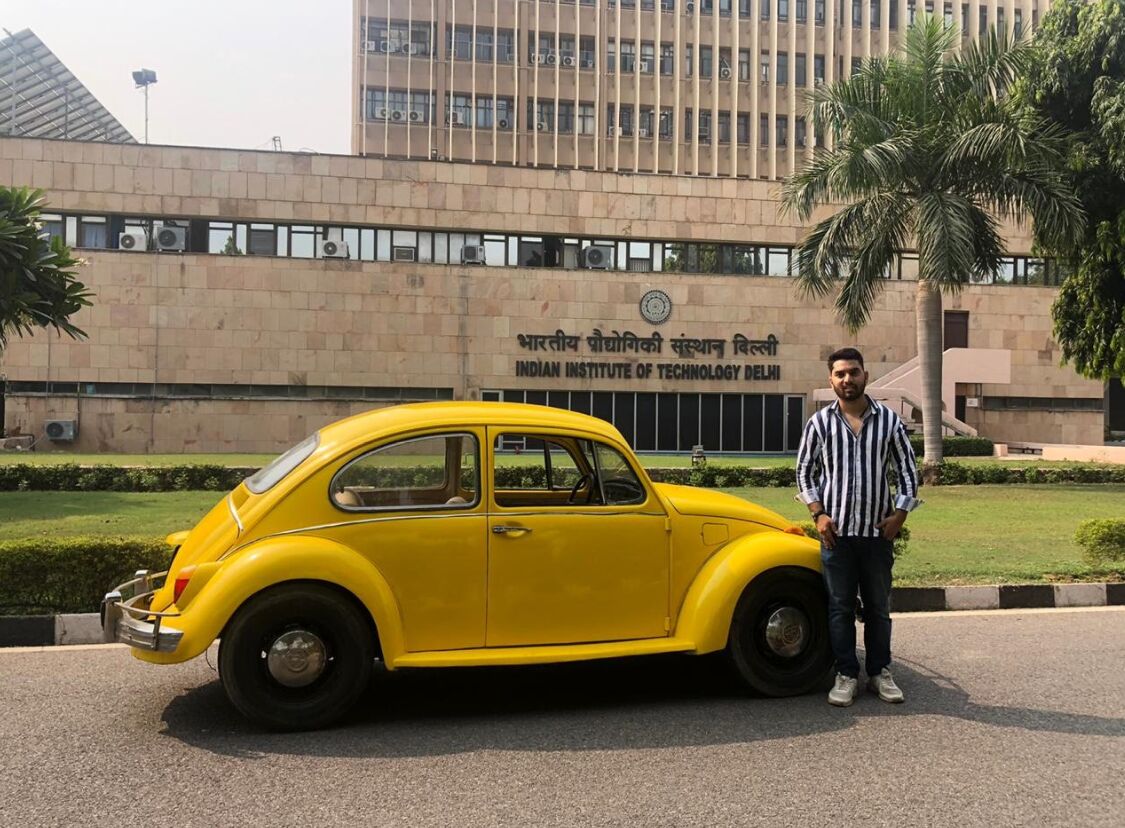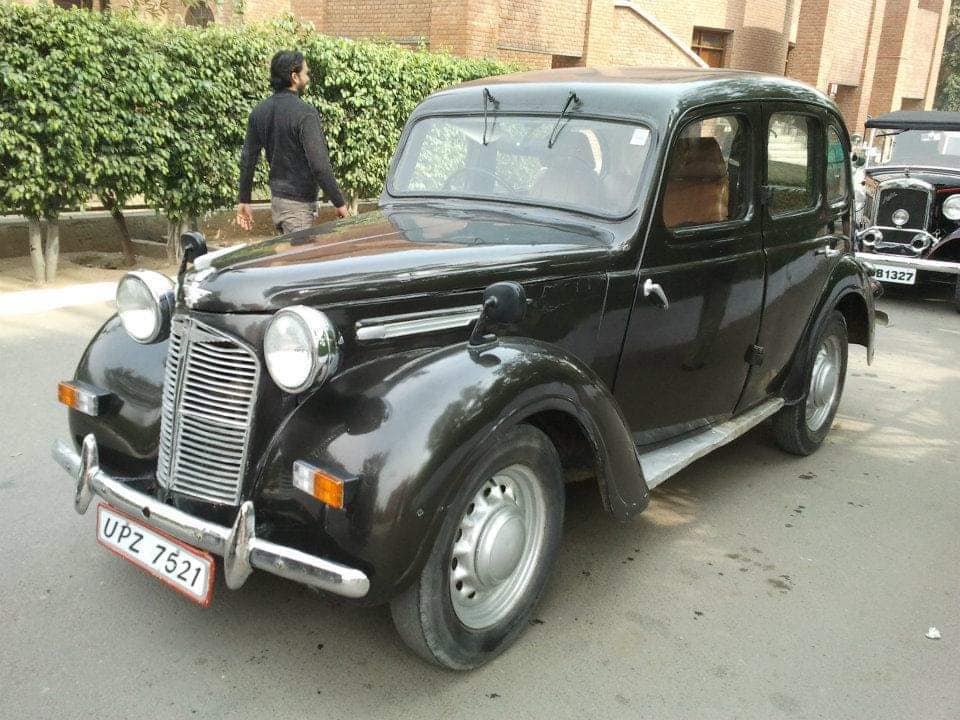Mohammad Jawaad Khan, a 23-year-old entrepreneur from the small town of Bhaderwah in the picturesque Chenab Valley of Jammu, is on the cusp of something big in India’s still emerging electric vehicle (EV) market. His New Delhi-based startup, Tadpole Projects, is pioneering the conversion of fossil fuel guzzling vintage cars into electric in India, while also doing the same for modern IC-engine four-wheeler vehicles.
Incorporated in September 2020 and closely associated with the Centre of Excellence for Research on Clean Air (CERCA) at IIT-Delhi, the startup has already retrofitted vintage cars like the Volkswagen Beetle (1948) and an Austin 10 (1936), while also doing the same for ubiquitous modern four-wheelers like the Maruti Swift DZire and Honda City.
“At Tadpole Projects, we want to enhance the EV ecosystem in the country without adding new cars on the road. As EV retrofitters, we provide a solution which is both economical and sustainable. But where we make a real difference is our ability to maintain the same driving feel of the former IC-engine car and the ability to provide customised solutions for each customer,” says Jawaad Khan, speaking to The Better India, earlier this week.
‘Always had an interest in innovation’
Jawaad comes from humble beginnings. His father, a shopkeeper, runs a small store in the tourist town of Bhaderwah, while his mother is a government school teacher. Bhaderwah has a relatively high literacy rate (86.6%), although very few venture into entrepreneurship. But before Jawaad ever thought of becoming an entrepreneur, he grew a deep fascination for making and innovating things, and science.
“Science has fascinated me since childhood. I always had an interest in making and innovating things. I have spent a lot of time in electric/mechanic repairing shops learning how machines operate. Sometimes I would fix things, but mostly I broke them. Growing older, I also developed a very keen interest in technological advancements in various fields,” he recalls.
That’s how he developed an interest in electric vehicles. Studying electrical engineering at the Swami Vivekanand Institute of Engineering and Technology (SVIET) in Rajpura, Punjab, for his graduation project, he built a high-speed EV called the ‘SVIET Volta’ in 2019. Spending more than 15 months building it alongside the Electrical Engineering Department R&D Cell of SVIET, the EV maintained a top speed of 110 kmph.
After his BTech, the plan was to prepare for his GATE (Graduate Aptitude Test in Engineering) exam and apply for an MTech in an elite engineering institution. But following his stellar project in college, he was invited to an event at IIT-Delhi. There, he met Arun Duggal, an IIT-Delhi alumnus who also helped set up CERCA.
“At the event, Arun Sir asked me whether I could convert a vintage car like the 1948 Volkswagen Beetle into an electric, and after a brief discussion, I was invited to work on the project,” recalls Jawaad.
What appeal does converting vintage cars hold for him?
“It is beautiful to see the emotional attachment a person shares with their vehicle, particularly a vintage. The memories that a small box of metal carries with itself is immense. Instead of seeing the owners of these artistic vintage cars suffer to keep the memory of their fuel-guzzling vehicles alive, why not design a flawless solution that can ease their presence on the road. That’s what inspired me to work on such projects,” recalls Jawaad.

Converting the first IC-engine vehicle into an EV
By November 2020, Jawaad successfully converted the 1948 Beetle owned by Major (Retd) Manjit Rajain of the Tenon Group of companies into an EV.
“During the 6 months we took to convert the Beetle, we had sourced the perfect components, optimum motor and battery as per the owner’s requirements. We also took utmost care of the existing machinery, which was a big challenge. People are mesmerised by the presence of vintage cars on roads. These cars so gracefully depict the history and the evolution of automobiles. When you ask any vintage car owner about the hardships to maintain them and keep them in running conditions, you will understand how tough it’s to find authentic parts and genuine workshops who actually care about these pieces of art. This motivated me to bring out the best in myself and set a proper example,” he says.
Meanwhile, for the 1936 Austin 10 vintage car, Jawaad is following a similar process of replacing its engine with a 15 KW motor, which allows the vehicle to attain a top speed of 60 kmph. The car can reach higher speeds of say 70 kmph, but it will affect the battery range and performance. Maintaining 90% of the original body of the car, his team connected the electrical motor to the rear wheel drive of the car coupled with a gear box.
He has also attached a 72V 220 Ah (Amp-Hours) lithium iron phosphate battery, which offers a battery range of 150 km on a single charge. It typically takes five to six hours to charge the car using an AC charger. On DC chargers, it can be done in three.
“We also needed a big battery pack since it needed enough juice to last for a reasonable distance. The front trunk of the car was entirely taken up by the battery pack, which also includes a converter that converts the electrical power to mechanical power. The vehicle also has a unique self-recharging property. The electric version does not have multiple gears but instead has only two — forward and reverse,” says Jawaad.
“At present we have orders for 30 cars comprising commercial, private and LCV segments in our pipeline. Our workshop is in East Delhi, where we have tie-ups with local mechanics. We have tie-ups with engineers for testing and electrical assembly requirements, which allows Tadpole to carry comprehensive quality checks of the product, the ability to deliver 100% customer satisfaction and quick after sales support for any queries,” he adds.
For the conversion process, whether for modern or vintage cars, the startup uses lithium-ion batteries which are an industry standard. Batteries vary in capacity according to the range which a customer demands between 120 to 300 km. The top speed also varies according to the car type. For vintage cars, the top speed is 60 kmph and for modern four-wheelers, it goes up to 100 kmph. The startup’s conversion cost starts from Rs 4 lakh and goes up based on the myriad of demands from the customer.
“Meanwhile, we have formulated EV kits that can be retrofitted into hatchbacks and sedans. But there is a slight difference in the specifications of the kit in sedans and hatchbacks. After conversion, these hatchbacks and sedans offer a battery range of 80 km per charge with air conditioning and a top speed of 80 kmph. They are powered by a 15 KW motor, a LiFePO4 battery with a well-structured battery management system, and a controller for battery and motor. If you’re going for hatchbacks, battery capacity is 12 kwh. For sedans, it is 15 kwh but speed and range stays the same. We even offer customised conversion kits too. With DC chargers, you can charge these batteries in less than 40 minutes. Also, we are adding an artificial sound system in our cars which will generate a sound when a rider accelerates it, giving the rider a feel of the old vehicles,” explains Jawaad.

Future Prospects
The startup has received seed funding of Rs 25 lakh for initial set up and operational costs. They are currently in the final stages with multiple investors for further funding and on the cusp of receiving approval from ARAI and ICAT. Meanwhile, they were recently approached by a major Bengaluru-based car rental company to retrofit 100 cars per month.
“We want to convert more modern vehicles and decrease the estimated volume of landfills generated by vehicle scrap by providing cost effective sustainable solutions to car owners and become a flag bearer to fulfill India’s EV dreams,” he says.
(Edited by Yoshita Rao)
No comments:
Post a Comment